 Working on one of our sites today, I came across a number of pieces which I had begun to prepare for publication some months ago – and was SHOCKED to come across the following, which I had neglected to complete – but given what has transpired since the author, Neal Ross wrote it in November 2019 – it has greater meaning today which I believe the reader will better understand.
Working on one of our sites today, I came across a number of pieces which I had begun to prepare for publication some months ago – and was SHOCKED to come across the following, which I had neglected to complete – but given what has transpired since the author, Neal Ross wrote it in November 2019 – it has greater meaning today which I believe the reader will better understand.
Consider these words alone… Everything the patriots of ’76 fought for, liberty, independence, and a government that would represent them equally and fairly, died with the defeat of the Confederacy in 1865…
For Homeschooling educators, one only has to look around and be AWARE of what is transpiring in America. What we are facing today appears to be a rerun of history gone by, and we can only hope that the people in this land will be prepared for the worst – and maybe we can overcome this modern tragedy! ~ Ed.
Who do you think fought the American Revolution? I’m not asking who wrote all the documents from that era, who were the important generals in the army, or who gave all the inspiring speeches; what I want to know is, who was it that took up arms and braved the harsh winters of Valley Forge and who stood toe to toe against the most formidable army on the planet at the time?
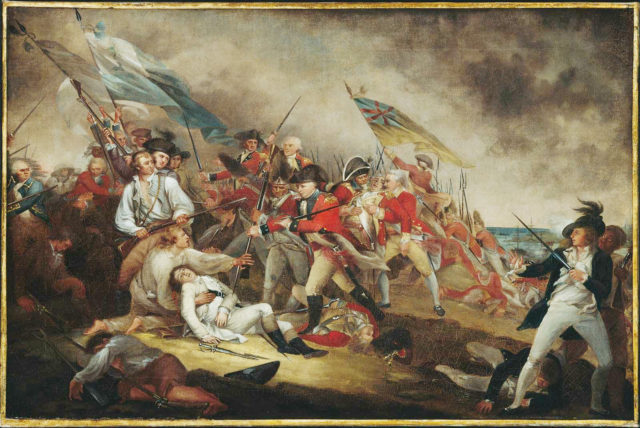
Bunker Hill ~ artist Joseph Warren
Sure, there were some well known and respected men among them, such as Joseph Warren who gave his life at the Battle of Bunker Hill, but for the most part they were common men; farmers, fisherman, and even preachers stood toe to toe against the most formidable army on the planet and who braved the harsh winter at Valley Forge with tatters for clothing that helped secure this country’s independence. Not only did they suffer under conditions that would make most today surrender the cause and return to the safety and comfort of their homes, they also suffered from lack of provisions from the government that had sent them off to secure the independence they had pledged their lives to obtain when they signed the Declaration of Independence.
The problem arose due to the fact that it was difficult, if not downright impossible, to get the States to pledge and send any money to the Continental Congress to support the war effort. For one thing it was hard for the States to levy taxes against people who they had told we were fighting a war to end oppressive taxation.
So what often happened was that these brave soldiers were given what amounted to IOU’s, or promissory notes, that pledged that when the government became solvent again it would pay them for their service to their country upon the conclusion of the war.
At the same time the Revolution was being fought our first system of government was in the process of being established, which would replace the Continental Congress with a Confederation Congress. However, once again this Confederation Congress could not levy any kind of taxes; it could only request that the States collect taxes from their citizens that would then be used to fund the operations of the government; including the war. Often the States refused to comply, other times they couldn’t as the people were already taxed to the breaking point to keep their State Legislatures functioning.
Once the revolution ended, and independence secured, those who had fought to obtain that independence went home; expecting to be paid soon for their service. However, with the Congresses inability to collect funds, those expectations went unfulfilled.
It is now that I would like to take a few moment’s pause to introduce a key player in our little drama-Alexander Hamilton. If you recall the title of this, you may begin to understand that to paint a proper picture of what happened I will have to skip around a bit and introduce new players to the game as their importance becomes relevant.
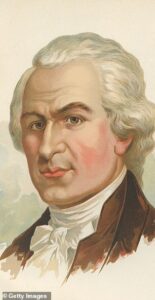
Alexander Hamilton
Alexander Hamilton was the bastard child of a Scotsman named James Hamilton who lived in the West Indies. As a child his father abandoned him, and when his mother died of Yellow Fever Hamilton, along with his brother were left orphans. Hamilton eventually found work as a clerk at Beekman & Cruger, a local import export business. He soon proved his worth and ended up keeping the books for the company.
In 1792 a hurricane struck the West Indies and Hamilton wrote a lengthy letter explaining the devastation it caused. This letter was read by Hugh Knox, a local minister and journalist, who published it in a local paper. It then caught the attention of community leaders for its prose; especially considering that the young Hamilton had never received any formal education. These community leaders saw potential in Hamilton and raised enough funds to have him shipped off to America where he could get a good education.
Whether it was ego, or something else, Hamilton sought glory for himself, and he felt that the best way to achieve it was by proving one’s self in combat. Therefore, if glory was what Hamilton sought, he certainly came to the right place at the right time, for his new home was to enter into a war which would determine the future course that country would take. Somehow, when that war came, Hamilton found himself serving as the aide de camp to none other than George Washington. The young Hamilton must have made an impression upon Washington, for later, when Washington was elected President, Hamilton would be chosen as his Secretary of the Treasury under the system of government that would eventually replace the Confederation.
It was during the Revolution that Hamilton witnessed firsthand the consequences of Congresses inability to raise revenue to support the war effort; which probably led him to loathe a system in which the States held so much power that they could stifle the requirements of the central government. It also didn’t hurt that, as an immigrant, he owed no loyalty to a particular State; his loyalty was to the country that had adopted him and gave him the opportunity to succeed based upon his own wit and drive.
That’s enough about Alexander Hamilton for a few minutes, so let’s get back to those soldiers who had risked their lives to obtain America’s independence. As I said, many of them had been paid by what amounted to IOU’s, and upon returning home from the war were in need of funds to resume their lives; funds which unfortunately weren’t forthcoming. The States had their own problems with war debts and the Confederation Congress was unable to raise the revenue to make good on those IOU’s.
Enter into our little story a group of greedy leeches known as Speculators. A speculator is someone who invests in a commodity, be it goods or financial stocks or bonds, at a low price, hoping to make a substantial profit later. In a way it is similar to how people play the stock market today; buy low then sell high, but in this instance speculators weren’t playing the stock market, they were preying upon those who had served their country and were in dire need of cash to resume their lives.
So what these Speculators did was, they offered to buy these IOU’s from the men who held them for a fraction of their face value. For instance, if someone held an IOU for $100 the speculator might offer to pay them $10 for it. Many of those who had fought for our independence fell victim to these leeches and sold their IOU’s for a mere pittance of their face value just so they could get on with their lives with a little cash to start their lives again.
Now let’s return our narrative back to Mr. Hamilton for just a quick moment. After the war ended Alexander Hamilton made his way to New York where he became a lawyer, and also founded the Bank of New York; one of the oldest banks in the United States. Hamilton was a socialite, hanging out with the rich and wealthy, and was also closely tied to the leaders of the banking community; the very kind of people who made their livings speculating on things – including SPECULATORS.
As rich and influential men, these speculators exerted a great deal of influence on those who held positions of power within government. Once they had purchased up these IOU’s they sought to redeem them at full face value, plus interest. On top of all that, they demanded that they be paid in specie, (typically silver coins), or gold, and not in worthless paper money.
The only way the Legislatures could oblige them was to impose taxes upon the citizens so that they could raise the necessary revenue to pay off those IOU’s. So, in effect, these speculators had bought the IOU’s for pennies on the dollar from those who held them, then the Legislatures were going to levy taxes upon the very people those IOU’s had originally belonged to so that they could be paid off in full, plus interest.
That did not sit well at all with those who had risked their lives for the cause of American independence; not to mention those who had also been paid in IOU’s to support the cause by supplying them with the goods required to wage that war. One such man was Daniel Shays. Shays had served in the 5th Massachusetts Regiment in the Continental Army and had fought at Bunker Hill, Lexington and Saratoga. Shays was wounded in combat and returned home a distinguished veteran, only to find that he, along with many of his fellow patriots from the revolution, were suffering under burdensome taxes to pay the State’s war debt.
Shays, and many of his former compatriots, began protesting against these taxes. The first major protest occurred when they blocked off the courthouse in Northampton, preventing them from doing business. The governor, James Bowdoin, took no action at this time, but he did made plans for the militia to be called out should similar protests continue.
On September 5, 1786 another protest took place, this time in Worcester, and the governor called out the local militia; only to find that many serving within it were sympathetic to the cause of the protestors and refused to respond to the governors call for arms against the protestors.
On the 28th of November the protests turned to violent intent after several of the Shaysites, as they had begun to be called, were arrested or injured in an effort to arrest them. This led Shays and his fellow protestors to march to Springfield, where the armory was kept, in an attempt to seize the weapons held there and topple the ‘tyrannical government of Massachusetts.’
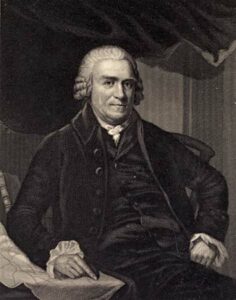
Samuel Adams
The rebellion was put down when the militia, led by William Shepard, confronted the Shaysites with a force of around 1,500 men, amassed to defend the armory against them. When cannon fire upon the Shaysites killed four and wounded twenty the assault collapsed and the protesters retreated into the woods.
Later, when many of them were captured, we witness a surprising change of positions among one of the leading members of the resistance to King George III, and a leader of the Son’s of Liberty-none other than Samuel Adams himself.
Instead of taking the side of the Shaysites, he painted them as disorderly guerillas; going so far as to call them subversive British Agents. Adams, as an appointee of Governor Bowdoin, pushed for the suspension of habeas corpus and the maximum penalty, (death), for all involved in Shays Rebellion.
Enter into our story John Hancock; you know, the guy who signed the Declaration of Independence in big, bold writing; just so jolly old King George would be sure to see it. Luckily for the Shaysites, Hancock had not proven a turncoat to his principles, as Sam Adams had appeared to, and when Hancock saw what charges were being introduced against them he ran for Governor of Massachusetts, and in a landslide election ousted Governor Bowdoin.
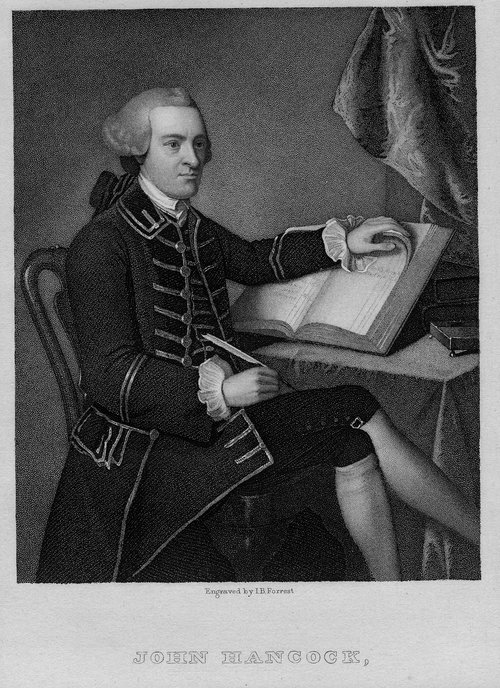
Under Hancock’s governorship, aided by a major turnover in both the Legislature and the courts, all the Shaysites except for two, John Bly and Charles Rose, were pardoned of their crimes as long as they promised to never do anything like that again. The pardoned Shaysites were allowed to return to their homes, although they were vilified by the press and many within the State of Massachusetts; all for fighting against the very thing they had fought a revolution to free themselves from-oppressive taxation.
When word of Shays Rebellion reached the other States it sent shockwaves of panic throughout them; for many of them, including New Hampshire, Connecticut, South Carolina, Maryland and Vermont were taking the same steps Massachusetts had to pay off speculators who had purchased the IOU war debts within their own States. They feared that such an uprising could occur at any time in their State, and that the central government was too weak and ineffective to defend them – another reason which led to support for a convention to strengthen the existing government.
Now let’s return our little saga to Alexander Hamilton. After the war ended Hamilton returned to New York where he established himself as a lawyer, defending, primarily, British and those with British loyalties. One such case that Hamilton served as the defending attorney on was the case of Rutgers v Waddington.
After the war ended the New York Legislature enacted the Trespass Act, a law that stated that patriots could sue anyone who had occupied their home and caused damage, or destroyed them over the course of the war. In this case, Elizabeth Rutgers was suing Joshua Waddington for £8,000 because she had been forced to flee her home during the occupation of New York by the British during the war.
Hamilton took the position that the Trespass Act itself could not be enforced, as it violated the Treaty which had been signed by both the U.S. and Great Britain and the end of the war. The New York Court agreed with Hamilton, although Waddington was obligated to pay 10% of Rutgers original demand for £8,000.
It is unclear as to why Hamilton chose to take the side of British interests after the war, considering that he’d recently took up arms against the army of Great Britain. However, one can speculate based upon other actions he took later in his life. One of those actions was to establish the Bank of New York, one of the oldest banking institutions still in existence today. It is possible, since Hamilton sought to become a major player in business and banking, that he sought to curry favor with the big banking houses in Europe by defending their clients here in America; but that is only speculation on my part.
As Hamilton’s reputation and standing in society grew he amassed a substantial group of followers, or devotees, to his way of thinking; which was primarily to do anything they could to build America into a mighty economic and banking empire. Among his followers were Gouverneur Morris and Rufus King; both of whom, along with Hamilton, would become delegates to the convention that framed our constitution.
Let us not forget that Hamilton had seen the inefficiency of both the Continental and Confederate Congress through its inability to raise the necessary revenue to wage war. Add to that the fact that the existing government allowed a single State to block measures that might help achieve his dream of an American superpower of industry and banking, and maybe you’ll begin to understand why he acted as he did later in life once the constitution had been ratified.
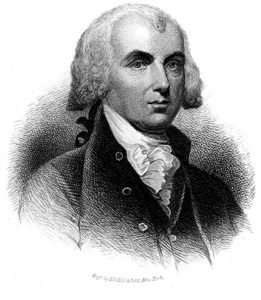
James Madison
Now it’s time to introduce a new cast member in this little soap opera of ours; James Madison. Madison, as well as Hamilton for that matter, were both brilliant thinkers and both were able to express themselves well; especially when it came to the written word. Madison was born and raised in Virginia, but unlike many of his counterparts, like Thomas Jefferson, he did not attend college in Virginia; instead he attended Princeton, in the center of business and banking territory.
I used to admire and respect Madison, but once I began to learn more about him, he became an enigma to me. As my friend Mike says about him, Madison could come down on both sides of an issue in the same paragraph.
Although I haven’t discovered why yet, Madison, along with Hamilton, felt that the existing government under the Articles of Confederation did not give the central government enough power; that too much power was retained by the States. Although he kept his thoughts to himself, he was studying other forms of government to learn what form he might be able to play a role in establishing to replace the Confederation we had at the time.
With Congresses inability to raise revenue, combined with the facts that the States had begun to erect barriers to trade and commerce, and the fear over similar uprisings such as the one that occurred in Massachusetts, the climate was right for those who saw the Confederation as weak and ineffective to take steps to install a much stronger, more centralized form of government.
The first effort towards taking steps to replace the Confederation Congress failed miserably. The Annapolis Convention, held in 1786, was only attended by delegates from 5 States; not nearly enough to conduct business and have the support of the remaining 8 States. But they did manage to send out a request that the States send delegates to another convention, to be held in Philadelphia the following spring.
Prior to the convening of the Philadelphia Convention James Madison sent a letter to George Washington in which he stated, “Having been lately led to revolve the subject which is to undergo the discussion of the Convention, and formed in my mind some outlines of a new system, I take the liberty of submitting them without apology, to your eye.
Conceiving that an individual independence of the States is utterly irreconcileable with their aggregate sovereignty; and that a consolidation of the whole into one simple republic would be as inexpedient as it is unattainable, I have sought for some middle ground, which may at once support a due supremacy of the national authority, and not exclude the local authorities wherever they can be subordinately useful.”
It may seem of little importance now but you have to remember that these delegates were sent to Philadelphia by their State Legislatures, and they were given specific instructions to come up with proposals for amendments to the existing constitution, (The Articles of Confederation), not abolish them and replace them with a proposal for an entirely new system of government. So when they finally met in Philadelphia and locked the doors, then went about producing the constitution, they were in effect, orchestrating a coup to overthrow the existing system of government. With that in mind, let’s proceed to a short discussion of what transpired behind closed doors during the summer of 1787.
The only real record we have of what went on during the summer of 1787 comes from notes taken by James Madison; notes that he kept secret until every member of the convention, including himself, had passed away. Rumor also has it that these notes were edited by Madison to make him look good for future historians; but that too is based upon speculation and hearsay.
I only wish to discuss two key points from this convention of miscreants who sought to overthrow the existing government. The first is a proposal made by James Madison in which he sought to bestow the federal government with an absolute negative, or veto, over all laws enacted by the States; placing the States in a subordinate capacity in all things. Luckily Madison’s proposal was rejected.
The other is the proposal introduced by one of the main characters of this little drama, Alexander Hamilton. Hamilton proposed a plan that would have almost done away with the individual States entirely; consolidating them into a single nation. He also proposed that the upper house of Congress, as well as the governor, (what we now call the President) serve life terms in office. Furthermore, whatever leaders were chosen to govern the States would be chosen by the national legislature, making them puppets to the central government and not representative of the people of their respective States. Finally, Hamilton also wanted a complete and total veto power for the federal government over all State laws. Luckily Hamilton’s plan was rejected as well; but we can get a picture of what kind of government he envisioned for America, and that gives us some understanding of his actions later on in this little drama.
 One final thought on the Convention of 1787 before I continue with my tale. This comes from an essay entitled Letter from a Federal Farmer to the Republican #1, written most likely by Richard Henry Lee, and published during the debate over whether or not to adopt the proposed plan submitted to the people for their consideration. In this essay Lee discusses the makeup and character of those who attended the convention, and it gives us an idea of where their interests and loyalties laid…
One final thought on the Convention of 1787 before I continue with my tale. This comes from an essay entitled Letter from a Federal Farmer to the Republican #1, written most likely by Richard Henry Lee, and published during the debate over whether or not to adopt the proposed plan submitted to the people for their consideration. In this essay Lee discusses the makeup and character of those who attended the convention, and it gives us an idea of where their interests and loyalties laid…
“The States. I believe, universally supposed the convention would report alterations in the confederation, which would pass an examination in congress, and after being agreed to there, would be confirmed by all the legislatures, or be rejected. Virginia made a very respectable appointment, and placed at the head of it the first man in America: In this appointment there was a mixture of political characters; but Pennsylvania appointed principally those men who are esteemed aristocratical. Here the favourite moment for changing the government was evidently discerned by a few men, who seized it with address. Ten other states appointed, and tho’ they chose men principally connected with commerce and the judicial department yet they appointed many good republican characters — had they all attended we should now see, I am persuaded a better system presented. The non-attendance of eight or nine men, who were appointed members of the convention, I shall ever consider as a very unfortunate event to the United States.”
If you’ve read any of my articles, especially the more recent ones, you are aware that an intense debate took place over whether or not to adopt the proposed constitution, with the Federalists supporting ratification and the Anti-Federalists opposing it. What you may not know is that this division formed the foundation upon which the first political parties were formed in America-but I’ll speak more on that in a bit.
Once the constitution was adopted the next step was to put the government it outlined into effect. Never since 1789 has the entire government been selected at one time, and it should come as no surprise that a majority of those chosen to fill the various positions within it would be culled from among those who supported ratification of the constitution; meaning Federalists.
George Washington was the obvious choice to be the first president, and I often wonder whether he was just a puppet used by Hamilton to push forward his agenda. Most of those elected to the first Congress were either followers of the Hamiltonian line of thinking, or who shared similar beliefs as to the purpose government should serve. Then of course Washington got to appoint the entire Supreme Court; which of course consisted primarily of Federalists like John Jay and James Wilson as well.
Almost immediately Alexander Hamilton, who had been chosen by Washington to be Secretary of the Treasury, went to work devising his plan for how government should benefit business and banking interests. Hamilton sought for the federal government to assume the debts of the States; and who benefits from debt if it isn’t creditors, or banks, to which he had close ties to.
This led to one of Madison’s historic reversals of opinions when he split with Hamilton and aligned himself with Thomas Jefferson in opposition to the federal assumption of State debt. It was only when a compromise was introduced in which the site of the nation’s capital be made further to the South, rather than in Philadelphia or New York that Madison and Jefferson conceded to Hamilton’s proposal.
The Hamilton introduced his coup d’ etat, his plan to establish a National Bank, based upon the band that controlled all of Great Britain’s currency and credit, the Bank of England. This again was opposed by Jefferson and Madison; which is surprising because years later, while serving as President, Madison would make another reversal of position and authorize the charter for the Second Bank of the United States. Fortunately for Hamilton, he had the President’s ear, and the warnings given by Jefferson fell, for the most part, upon deaf ears; giving Hamilton the green light to proceed with his plans.
Then Hamilton broke a promise he had made during the ratification debates. As one of the primary authors of the Federalist Papers, Alexander Hamilton had written, “It is evident from the state of the country, from the habits of the people, from the experience we have had on the point itself, that it is impracticable to raise any very considerable sums by direct taxation. Tax laws have in vain been multiplied; new methods to enforce the collection have in vain been tried; the public expectation has been uniformly disappointed, and the treasuries of the States have remained empty. The popular system of administration inherent in the nature of popular government, coinciding with the real scarcity of money incident to a languid and mutilated state of trade, has hitherto defeated every experiment for extensive collections, and has at length taught the different legislatures the folly of attempting them.
No person acquainted with what happens in other countries will be surprised at this circumstance. In so opulent a nation as that of Britain, where direct taxes from superior wealth must be much more tolerable, and, from the vigor of the government, much more practicable, than in America, far the greatest part of the national revenue is derived from taxes of the indirect kind, from imposts, and from excises. Duties on imported articles form a large branch of this latter description.
In America, it is evident that we must a long time depend for the means of revenue chiefly on such duties. In most parts of it, excises must be confined within a narrow compass. The genius of the people will ill brook the inquisitive and peremptory spirit of excise laws. The pockets of the farmers, on the other hand, will reluctantly yield but scanty supplies, in the unwelcome shape of impositions on their houses and lands; and personal property is too precarious and invisible a fund to be laid hold of in any other way than by the inperceptible agency of taxes on consumption.“
What Hamilton did was to convince the president to sign into law an excise tax upon distilled spirits produced in the U.S.; which primarily meant whiskey. This was to be a direct tax, the very kind Hamilton had promised that the government would not rely upon for the revenue to fund the government’s operations.
That did not go over well, not at all…
Many of the rural farmers took some of the corn they grew and distilled it down into spirits that they could then sell to supplement their income; meaning, they made moonshine and sold it. This tax would hit them the hardest as most of them were just scratching out a living for themselves and this tax would be a burden they could not handle. So, just as Daniel Shays began to protest against what he believed to be an oppressive tax, a group of protestors in, primarily, Western Pennsylvania began protesting the Whiskey Tax.
Protests began almost immediately, and they soon turned into more than just refusing to pay the tax. On September 11, 1791 an excise officer, Robert Johnson, was making his route through Western Pennsylvania when he was surrounded by a mob dressed as women. They stripped Johnson naked and then proceeded to tar and feather him. However, Johnson had recognized two of the men and warrants were issued for their arrest and John Connor was sent to issue them. Connor met the same fate as Johnson; however instead of being released he was tied to a tree and left for five hours before being found.
Incidents escalated, including the house of John Neville was burnt down when shots were exchanged between protesters and militia members who had been sent to protect him. Less than a week later an angry mob, led by David Braddock, attacked a mail carrier and discovered three letters from Pittsburg condemning the attack on Neville’s house, which incited them to march upon Pittsburg. Once there they were met by dignitaries who told them the letter writers had been expelled, and offered them 3 barrels of whiskey as a peace offering.
Our good buddy Alexander Hamilton had been paying close attention to this, after all it was HIS tax that they were rebelling against. He urged President Washington to take action to quell this rebellion, but Washington chose to send a peace envoy instead. When the peace envoy failed to end the rebellion Washington met with his cabinet and Supreme Court Justice James Wilson, another federalist ally of Hamilton, told the president that the use of military force was authorized under the auspices of the Militia Act of 1792, so Washington himself led a force of over 12,000 militia men into Pennsylvania to put down this rebellion; the first and only time an acting Commander in Chief has led military forces into action.

Whiskey Rebellion
When the militia arrived they were met with a few angry protesters, but the leaders of the rebellion had already fled into the woods. A few protesters were arrested, but later pardoned by Washington, and that was pretty much the end of the Whiskey Rebellion. However it did leave us with one lasting message, the U.S. government was willing to use military force to ensure that the taxes it was owed would be paid…that will play an important role in what was to come later.
Travelling backwards a bit, one of the other policies enacted by Alexander Hamilton was the institution of protective tariffs which would place taxes upon incoming European goods to allow U.S. made goods to be competitive among consumers. Many, if not a majority of these goods were consumed in the South, were it was easier to offload them at Southern ports than have U.S. made goods shipped from way up North; so these tariffs hit them harder than they did their Northern brethren.
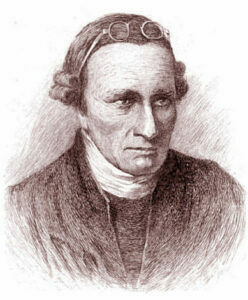 Yet all the policies enacted by Hamilton and supported by his puppet president, Washington, went against what Patrick Henry had said was the purpose of government. In a speech before the Virginia Ratifying Convention, Henry told his fellow delegates, “You are not to inquire how your trade may be increased, nor how you are to become a great and powerful people, but how your liberties can be secured; for liberty ought to be the direct end of your Government.” So it would seem that, from the get go, there was a complete difference of opinion as to what purpose the government should serve.
Yet all the policies enacted by Hamilton and supported by his puppet president, Washington, went against what Patrick Henry had said was the purpose of government. In a speech before the Virginia Ratifying Convention, Henry told his fellow delegates, “You are not to inquire how your trade may be increased, nor how you are to become a great and powerful people, but how your liberties can be secured; for liberty ought to be the direct end of your Government.” So it would seem that, from the get go, there was a complete difference of opinion as to what purpose the government should serve.
Now we must discuss the distinction between the two regions of the country if we are to understand what happened next. The Northern economy was based primarily upon business, industry and banking while the South was predominantly agricultural, or agrarian. Both regions viewed the purpose and function of government differently. The South felt the government should confine itself to the few powers enumerated while the North felt that the coercive power of government should be used to benefit business and industry as well as provide for the other needs outlined in the constitution. This led to divisions within Congress that came to a head much sooner than the outbreak of hostilities we call the Civil War.
In 1794

John Taylor
of Caroline was a Senator representing the Commonwealth of Virginia. One day he was approached by Rufus King, another Senator representing the State of Massachusetts. King asked if he could have a few moments in private to discuss something of great importance with Taylor. King, who was later joined by Oliver Ellsworth of Connecticut and proceeded to tell Taylor that it was inconceivable that the Union could continue. King explained that the differences between the North and South were such that continued coexistence under the same government would be next to impossible; the North and South would be constantly fighting for control of the government; both having different ideological beliefs as to what purpose the government should serve.
King then introduced a bombshell; he recommended a peaceful division of the Union and told Taylor to pick the line that demarked the division between North and South. Both King and Ellsworth told Taylor that the Northeast would never submit to the politics of a government led by Southerners, and that a peaceful division was better than the alternative.
Taylor transcribed the conversation then delivered it to the president, James Madison. This must have come as close to Armageddon to Madison as anything earthly possible, the dissolution of all that he had worked for by establishing a centralized government. So Madison stuck the letter into a lock box and hid it away with instructions that it never be published.
After Madison, and his wife Dolly died, Madison’s instructions died with them, and the box was passed down until the contents were made public. The point I’m trying to make here is that there were serious problems with the Union that date back over half a century before those divisions erupted into civil war.
To go any further without discussing slavery would be a total lack of honesty on my part, and one thing I try to take pride on is being as honest as I can with what I say.
Let me begin by saying that I believe, with all my heart, that slavery of any kind is evil. That said, it could have ended had the delegates to the Convention of 1787 had the courage to end it by making it illegal under the constitution. But that would have ensured the South never adopted the constitution; so they compromised by neither legalizing, nor criminalizing it. So if there is to be any blame for the continuation of slavery in America, put it on the shoulders of those who didn’t have the guts to put an end to it in 1787.
Once the government outlined by the constitution went into effect it did, however enact laws requiring that escaped slaves be returned to those who had purchased them; which in a way was saying they supported slavery where it already existed.
This offended some in the North who viewed slavery as a sin, and many of them helped those held in bondage to seek their freedom. The thing is though that freedom was not to be found in the North. I’d be willing to bet that most of you have heard of the Underground Railroad; the path used by escaped slaves to obtain their freedom. What most of you probably aren’t aware of is that the Underground Railroad’s final stop was in Canada. The Northern States did not want the freed negroes running around in their cities; so they helped them escape, so long as they went to Canada for their freedom.

Alexis de Tocqueville
In fact, in the 1830’s when Alexis de Tocqueville came to America to study our system and culture he noticed, “In that part of the Union where the Negroes are no longer slaves, have they come closer to the whites? Everyone who has lived in the United States will have noticed just the opposite. Race prejudice seems stronger in those states that have abolished slavery than in those where it still exists, and nowhere is it more intolerant than in those states where slavery was never known.”
It appears to me that the North’s concern was not so much for the welfare of the black’s as much as it was their opposition to the institution of slavery itself; but those are just my thoughts on the matter.
With government it was different altogether. I could be wrong, but I think those who represented the North knew that the South depended upon slave labor for its agricultural economy, and for the South to be able to pay the tariffs the government imposed they allowed slavery to continue where it already existed. The problem arose when new States began to enter the Union and the question of whether slavery be allowed to become an institution within them.
You see, under the constitution slaves counted towards representation in Congress, and the North and South were already at odds over the purpose of government, and should the slaveholding States become a majority in Congress they could halt, or abolish entirely the agenda that began under Hamilton. So they fought tooth and nail to prevent slavery from spreading, and the South fought tooth and nail to allow the newly admitted States decide for themselves whether to practice slavery.
On top of all this, in 1857 the Supreme Court, in the case of Dred Scott v Sanford, basically declared that slavery was legal under the constitution. Whether or not they were morally right in their decision is irrelevant, as they held that slavery was not prohibited by the constitution; meaning it was legal under the supreme law of the land; and all those who opposed it were in opposition to the law; including those who helped slaves escape to freedom.
Getting back to the protective tariffs that burdened the South, 30 years prior to the Supreme Court handing down their decision on the Dred Scott case a Senator from the State of Missouri, Thomas Hart Benton, made the following comments before Congress…
“I feel for the sad changes, which have taken place in the South, during the last fifty years. Before the Revolution, it was the seat of wealth, as well as hospitality. Money, and all it commanded, abounded there. But how is it now? All this is reversed. Wealth has fled from the South, and settled in regions north of the Potomac; and this in the face of the fact, that the South, in four staples alone, has exported produce, since the Revolution, to the value of eight hundred millions, of dollars; and the North has exported comparatively nothing….Under Federal legislation, the exports of the South have been the basis of the Federal revenue….Virginia, the two Carolinas, and Georgia, may be said to defray three-fourths, of the annual expense of supporting the Federal Government; and of this great sum, annually furnished by them, nothing, or next to nothing is returned to them, in the shape of government expenditures. That expenditure flows in an opposite direction—it flows northwardly, in one uniform, uninterrupted, and perennial stream. This is the reason why wealth disappears from the South and rises up in the North…taking from the South, and returning nothing to it.”
Then in 1861 outgoing president James Buchanan signed into law the Morrill Tariff, which increased the tariff rate to nearly 40% on all goods entering the United States. This, along with the election of Abraham Lincoln, along with the interference with slavery, was too much for the South to bear. South Carolina had already issued a declaration of secession in 1860. Then in 1861 Mississippi, Florida, Alabama, Georgia and Louisiana all issued their own declarations of secession.
So when Lincoln took office the Union he was to govern was coming apart right before his eyes. Congress had already tried to stave off the secessionist movement by introducing and passing a proposed amendment which would have made slavery permanent and irrevocable in the United States. Known as the Corwin Amendment, the text of which states, “No amendment shall be made to the Constitution which will authorize or give to Congress the power to abolish or interfere, within any State, with the domestic institutions thereof, including that of persons held to labor or service by the laws of said State.”
Twice in his Inaugural Address President Lincoln attempted to ensure the South that the government would take no action to interfere with slavery. His first comment states, “I have no purpose, directly or indirectly, to interfere with the institution of slavery in the States where it exists. I believe I have no lawful right to do so, and I have no inclination to do so.”
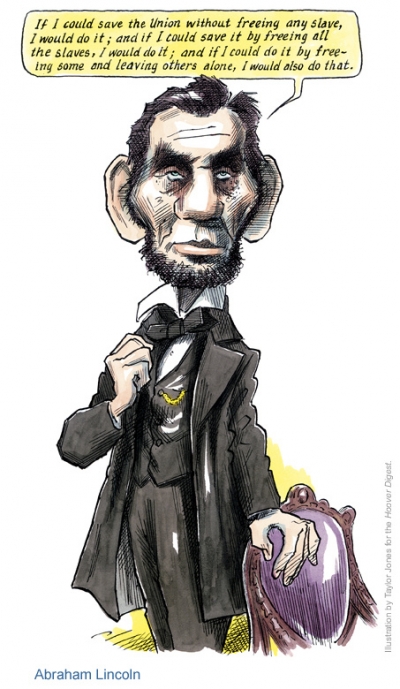 Not only did Lincoln say he had no intention of interfering with slavery, he also stated he supported the proposed Corwin Amendment, “I understand a proposed amendment to the Constitution – which amendment, however, I have not seen – has passed Congress, to the effect that the Federal Government shall never interfere with the domestic institutions of the States, including that of persons held to service … holding such a provision to now be implied constitutional law, I have no objection to its being made express and irrevocable.”
Not only did Lincoln say he had no intention of interfering with slavery, he also stated he supported the proposed Corwin Amendment, “I understand a proposed amendment to the Constitution – which amendment, however, I have not seen – has passed Congress, to the effect that the Federal Government shall never interfere with the domestic institutions of the States, including that of persons held to service … holding such a provision to now be implied constitutional law, I have no objection to its being made express and irrevocable.”
So if Lincoln’s concern was not to end slavery, what was it? Basically it was the same reason that led Washington to amass 12,000 troops and march them into Pennsylvania; the threat of non- payment of taxes owed the government. Remember what Senator Benton said, that the South was funding nearly 3/4 of all the operations of the government; if Lincoln let the South leave his government would be broke before, as one local paper said, before the next harvest of corn.
Lincoln simply could not allow that to happen, so he too amassed an army, this time 75,000 strong. At the time, although Virginia was sympathetic to the plight of the South, she had not yet seceded. That all changed when the president sent the governor of Virginia a request that Virginia supply troops to put down the insurrection in the South.
Governor Letcher’s response to Lincoln’s Secretary of War Simon Cameron is as epic as they come, stating..
“I have only to say that the militia of Virginia will not be furnished to the powers at Washington for any such use or purpose as they have in view. Your object is to subjugate the Southern States, and a requisition made upon me for such an object – an object, in my judgment, not within the purview of the Constitution or the act of 1795 – will not be complied with. You have chosen to inaugurate civil war, and having done so, we will meet it in a spirit as determined as the Administration has exhibited towards the South.”
Virginia seceded the following day, to be quickly followed by Arkansas, North Carolina and Tennessee. So the division, under less than peaceful circumstances that Rufus King and Oliver Ellsworth feared would happen, had happened and the Civil War began as a result of one simple thing; and that thing WAS NOT slavery, it was a difference of opinion as to what purpose the government should serve.
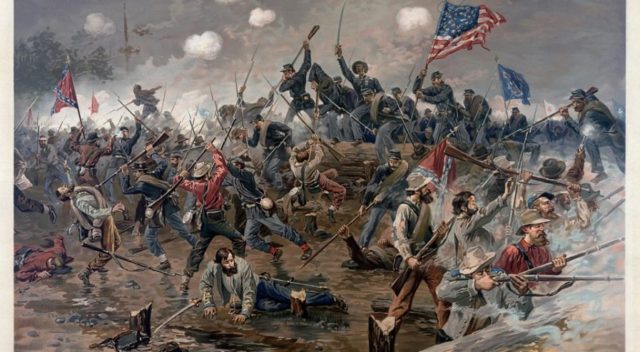
For the next 4 years the North fought against the South, with the North fighting to keep the Union intact and the South fighting for the purposes enshrined in the Declaration of Independence, “That whenever any Form of Government becomes destructive of these ends, it is the Right of the People to alter or to abolish it, and to institute new Government, laying its foundation on such principles and organizing its powers in such form, as to them shall seem most likely to effect their Safety and Happiness.”
If, as many say today, the Civil War was fought to end slavery, then it was an illegal war, for if you recall the Supreme Court had declared that slavery was legal under the constitution. So if the North was fighting to end it, it was fighting against the constitution and the SCOTUS’s ruling on slavery under their interpretation of the constitution; meaning the South was fighting a justified war.
We all know the South lost the Civil War, but do we also know that the victors of any conflict always get to write the history of that conflict? Is it any wonder the South was portrayed as fighting to perpetuate slavery even though the facts clearly prove otherwise?
One other thing; if the North truly was fighting a justified war, and the South was guilty of treason, why, especially with the hatred displayed by Northern Republicans towards the South, were none of the Confederate leaders ever charged with treason and brought to trial? Chief Justice Salmon P. Chase offers some insight as to why…
“If you bring these [Confederate] leaders to trial it will condemn the North, for by the Constitution secession is not rebellion. Lincoln wanted Davis to escape, and he was right. His capture was a mistake. His trial will be a greater one.”
Had they been brought to trial history would have been required to record that Lincoln’s war was unjustified, so they let them go in peace without ever charging a single one of them for treason; although throughout the war that is exactly what they were accused of.
We will never know how the period after the conclusion of the Civil War would have gone under Lincoln, for on April 15, 1865 he was assassinated and the radical Republicans in Congress basically took over the government, even though Lincoln’s successor, Andrew Johnson did all that he could to halt their subjugation of the South.
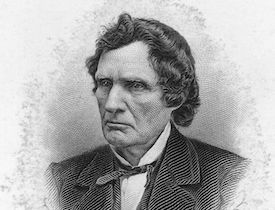
Thaddeus Stevens
Representative Thaddeus Stevens of Pennsylvania was one of the leading members of this radical branch of the Republican Party, and he is quoted as saying, “The talk of restoring the Union like it was, and the Constitution as it is, is one of the absurdities which I have heard repeated until I have become sick of it. There are many things which make such an event impossible. This Union never shall, with my consent, be restored under the constitution as it is … The Union as it was and the Constitution as it is–God forbid it. We must conquer the Southern states and hold them as conquered provinces.”
Stevens got his wish, the South was told that they must submit to the requirements imposed upon them by the various Reconstruction Acts if they wished to re-enter the Union under the conditions they had been before they seceded. Military leaders were put in place to govern the South, and they had to rewrite their State constitutions and submit them to Congress before they would be allowed to form governments under them. Not only that, no one who had served or supported the Confederacy, which was damn near everyone in the South, could hold political office; meaning the floodgates were opened for Northern Carpetbaggers to come in and plunder the South even more.
Then, after all they had suffered, they were hit with a sledgehammer; the 14th Amendment. One of the requirements they must submit to before being allowed to re-enter the Union was that they ratify the 14th Amendment. That sounds like coercion, or duress to me; and if I’m not mistaken, under contract law, any contract entered into against your will is null and void.
Yet the North demanded it of them, and they were forced to comply. Over 100 years later Supreme Court Justice Thurgood Marshall would say, “While the Union survived the Civil War, the Constitution did not. In its place arose…the Fourteenth Amendment.”
The 13th Amendment may have ended chattel slavery in America, and the 14th Amendment may, I emphasize may, as I believe it was never lawfully ratified, granted the freed slaves some semblance of rights. But it did one other thing, it made debt slaves of every man, woman and child in America.
I’d be willing to bet an entire paycheck that a good majority of the people alive today do not know that there are 3 sections to the 14th Amendment, the fourth of which states, “The validity of the public debt of the United States, authorized by law, including debts incurred for payment of pensions and bounties for services in suppressing insurrection or rebellion, shall not be questioned.”
It does not say the federal debt, it says the public debt; meaning it is OUR debt, and our labor is the collateral that is used to pay for it, or the interest upon it; as out taxes no longer pay any of the principle of the debt-and they are reaching the point where they will barely pay the minimum balance on the interest we owe.
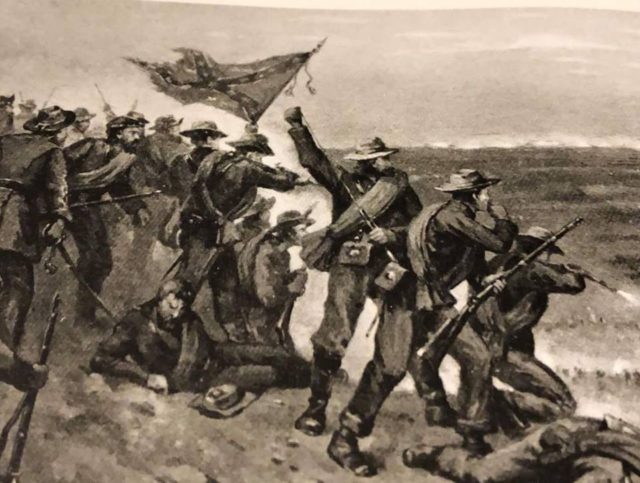
That is the legacy of the Civil War, and it’s all been a downward spiral ever since. If the Civil War taught us anything it taught us that the question of who is more powerful, the creators of government or government itself, has once and for all been answered. For if a people cannot abolish, or sever the ties that bind them to a government supposedly based upon the principal of consent of the governed, then we are truly slaves.
It also answered the question of whether or government was to be one of limited powers, or one designed to benefit the rich and wealthy business and banking interests. This is as true today as it was back in 1861, with the only difference being which group of special interests the political parties pledge to support and assist through the legislative process.
Everything the patriots of ’76 fought for, liberty, independence, and a government that would represent them equally and fairly, died with the defeat of the Confederacy in 1865 and we’ve been slaves to a government whose only limitations upon their power are what they imagine are the powers granted them; and those that don’t offend so many voters that they simply stop voting. ~ N. Ross
As long as they can keep the voters fat dumb and happy the illusion of a free government will continue so long as they are given the choice of which slave master to vote for.
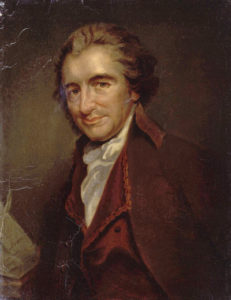 I weep for my country and what has happened to it, and I can barely contain my rage for the people who refuse to accept the truth. As Thomas Paine wrote long ago, “When I contemplate the natural dignity of man, when I feel (for Nature has not been kind enough to me to blunt my feelings) for the honour and happiness of its character, I become irritated at the attempt to govern mankind by force and fraud, as if they were all knaves and fools, and can scarcely avoid disgust at those who are thus imposed upon.”
I weep for my country and what has happened to it, and I can barely contain my rage for the people who refuse to accept the truth. As Thomas Paine wrote long ago, “When I contemplate the natural dignity of man, when I feel (for Nature has not been kind enough to me to blunt my feelings) for the honour and happiness of its character, I become irritated at the attempt to govern mankind by force and fraud, as if they were all knaves and fools, and can scarcely avoid disgust at those who are thus imposed upon.”
You can vote all you want today, but all you’re doing is participating in the fraud that began in 1787 when James Madison and his cohorts in Philadelphia sought to overthrow the only system of government that had a chance of staving off the tyranny we currently live under.
Enjoy the circus, for that’s all that’s left of what the patriots of 76 had hoped and risked their lives to bequeath to posterity. I hope the history books are honest about what happened once it all collapses. Who knows, maybe they’ll just use this as the final chapter on America.
November 13, 2019
 ~ The Author ~
~ The Author ~
Neal Ross, Student of history, politics, patriot and staunch supporter of the 2nd Amendment. Send all comments to: bonsai@syix.com.
If you liked Neal’s latest column, maybe you’ll like his latest booklet: The Civil War: (The Truth You Have Not Been Told) – and stay tuned – Neal has a new, greatly expanded book coming soon dealing with the harsh truths about the so-called American Civil War of 1861-1865. Life continues to expand for this prolific writer and guardian of TRUE American history.

Pingback: No need to panic, parents, over homeschooling | Metropolis.Café
Pingback: The Script for a 200 Year Long Soap Opera: How It All Unraveled | The Federal Observer